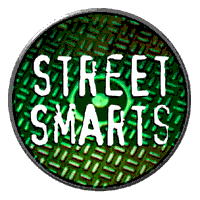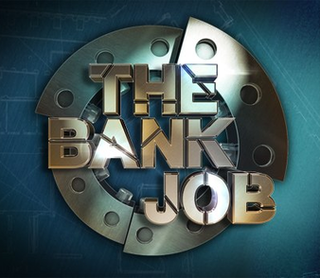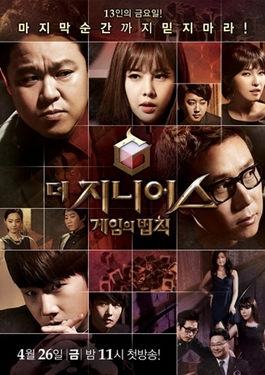There is one contestant each day who is faced with eight complete strangers (known in the programme as "wage-earners"), all of whom wear black T-shirts with their names printed on. They only speak once in play, at the beginning of the game, by saying their name, the town or city in which they live, and asking a rhetorical question of whether they earn the highest amount of money.
Each round eliminates one wage-earner and the wage that person earns. The aim is for the contestant to eliminate the lower wages first in order to keep the highest prizes remaining. The rounds are as follows:
- The contestant must choose one of the eight wage-earners to eliminate by first impressions only.
- Five significant facts are revealed about each of the seven remaining wage-earners.
- The wage-earners are given three 'yes or no' questions about what they do in their spare time.
- The contestant learns more about the remaining wage-earners' school days.
- The wage-earners are asked another series of 'yes or no' questions.
After these rounds, the contestant must decide which of the three remaining wage-earners earns the highest amount. At this point, the contestant has the option of being told the occupations of the three remaining wage-earners, but without any indication of which is which.
If the highest annual wage (of the three that remain at the end) is guessed correctly, the contestant wins that wage. However, if the contestant chose to reveal the three occupations, only half of the annual wage is awarded. If the wage-earner chosen by the contestant is not the highest-earning of the three, the contestant wins nothing. The wage-earner whom the contestant chose also receives £3000, regardless of actual wage; thus each of the wage-earners has an incentive to lead the contestant to think that he/she is the highest earner.

The Weakest Link is a British television quiz show, mainly broadcast on BBC Two and BBC One. It was devised by Fintan Coyle and Cathy Dunning and developed for television by the BBC Entertainment Department. The game begins with a team of nine contestants, who take turns answering general knowledge questions within a time limit to create chains of nine correct answers in a row. At the end of each round, the players then vote one contestant, "the weakest link", out of the game. After two players are left, they play in a head-to-head penalty shootout format, with five questions asked to each contestant in turn, to determine the winner.

Street Smarts is an American game show that featured two in-studio contestants trying to predict the outcome of interviews of people who were found on the street. The show, which was hosted by Frank Nicotero, aired in syndication from 2000 to 2005. Nicotero would be on locale with the on the street contestants, virtually any and everywhere in the United States. The in studio gameplay however, was at G4 and TMZ, headquarters, Victory Studios, in Glendale, California.

Game Ka Na Ba?, formerly Million-Million Na! Game Ka Na Ba?, Next Level Na! Game Ka Na Ba?, and Pilipinas Game Ka Na Ba is a Philippine television game show broadcast by ABS-CBN and Jeepney TV. Originally hosted by Kris Aquino, it aired on ABS-CBN's Primetime Bida line up from October 8, 2001 to February 27, 2004, and was replaced by Star Circle Quest. The show moved to the Bigtime Trio line up from November 15, 2004 to October 23, 2009, and was replaced by Showtime. The show was revived to Jeepney TV from October 12, 2020 to November 19, 2021 and on Kumu from February 19 to June 18, 2022. Robi Domingo serve as the final hosts.
Shafted was a British game show that aired on ITV from 5 to 26 November 2001 and was hosted by Robert Kilroy-Silk.

Miljoenenjacht, officially Postcode Loterij Miljoenenjacht, is a Dutch game show, sponsored by the country's postcode lottery, where a contestant and at-home viewer could win up to €5,000,000 or as little as €0.01. The show is broadcast at various times, spanning across six episodes for each set. The program was originally shown by TROS on NPO 2, but moved to creator John de Mol's channel Tien in 2005. After the channel was discontinued after its sale to the RTL Group, the program moved to RTL 4. In 2019, the program moved to SBS6 due to the transfer of Linda de Mol from RTL to SBS.

Grasz czy nie grasz is the Polish version of Deal or No Deal. It was shown at 7:00pm CET on Saturdays on Polsat. Zygmunt Chajzer was the original host. In its third year, the studio and graphics were updated, as they were to other international versions of the show.
Sale of the Century was a British game show based on a US game show of the same name. It was first shown on ITV from 9 October 1971 to 6 November 1983, hosted by Nicholas Parsons. Special Celebrity Sale of the Century editions aired occasionally, starting on 2 January 1981 with Steve Jones as host.
The Master is an Australian quiz show that debuted on Seven Network on 16 August 2006. The show was cancelled after its premiere episode. The remaining episodes aired over the non-ratings period in 2006–2007, with the final episode airing on 16 January 2007. Hosted by Mark Beretta, the show had a potential prize of $1,000,000. It was produced by Grant Rule and Seven Melbourne. Repeats aired on 7Two at 11am weekdays in late July 2021.

Identity is an American game show, created by Tim Puntillo, and produced by Reveille Productions for NBC. Hosted by magician Penn Jillette, with narrations by Joe Cipriano, the format focuses on contestants working out which facts are linked to one of 12 strangers in each episodes, through visual observations and deductions, with correct matches increasing the prize money they can walk away – up to a jackpot of $500,000 for matching all identities. Contestants have access to lifelines, denoted as "helps", which can assist at times, and may also ask questions to some of the strangers at various points during the game show.
Deal or No Deal is a game show which was aired in Singapore on MediaCorp Channel 5 and MediaCorp HD5 for two seasons. Based upon the original Netherlands format of the game show, each episode sees a contestant choosing one of 26 briefcases, each containing a cash amount between $1 and $250,000, and then attempting to win as much as possible either by gambling on having a high amount in their chosen briefcase, or making the game's hidden operator, named "the Banker", offer a considerable cash sum for their case regardless of what is inside. The amount a contestant wins is determined by pure luck – cash amounts are randomly allocated to each of the briefcases before each game, with contestants required to open a specific number of briefcases per round of the game to eliminate the cash amounts their chosen briefcase does not contain, in turn affecting how much is offered by the Banker.
Deal or No Deal in New Zealand is the New Zealand version of the international game show format. After Prime TV's success airing the Australian version of Deal or No Deal in New Zealand, a New Zealand produced version launched on TV3 on 6 June 2007. The show is hosted by radio comedian Jeremy Corbett and each show airs for one hour, on a Wednesday night, from 7:30pm to 8:30pm. The 26 cases range in value from $0.10 to $200,000.
Without Prejudice? is a British game show that aired on Channel 4 from 4 January 2003 to 16 April 2004 and was hosted by Liza Tarbuck.
Đi tìm ẩn số is the first Vietnamese version and also as the Southern Vietnamese version of Deal or No Deal, as a part of TFS's Tạp Chí Văn Nghệ. It premiered on June 19, 2005 on HTV7, hosted by Thanh Bạch.

Pointless is a British television quiz show produced by Banijay subsidiary Remarkable Entertainment for the BBC hosted by Alexander Armstrong. In each episode, four teams of two contestants attempt to find correct but obscure answers to four rounds of general knowledge questions, with the winning team eligible to compete for the show's cash jackpot.

The Bank Job is a British television game show broadcast live on Channel 4, hosted by George Lamb. It was first broadcast on 2 January 2012 and ended on 17 March 2012.
Two Tribes is a BBC game show that aired on BBC Two from 18 August 2014 to 31 August 2015, hosted by Richard Osman.

The Genius: Rules of the Game is the first season of The Genius debuted on tvN on April 26, 2013.

The Genius: Rule Breaker is the second season of The Genius, which debuted on tvN on December 7, 2013.
Gefragt – Gejagt (Asked—Chased) is a quiz show that has been broadcast on German television since 2012. It's also been broadcast on ORF 1. It is the German adaptation of ITV's show The Chase.

The Challenge: Vendettas is the thirty-first season of MTV reality competition series, The Challenge. The official trailer was shown during the special mini-series Champs vs. Stars. For the first time, this season featured alumni from the US version of Big Brother, and the UK TV shows Ex on the Beach and Geordie Shore, competing with alumni from the regular shows of The Real World, Road Rules, The Challenge, and Are You the One?. For the first time ever, there was only one winner.










